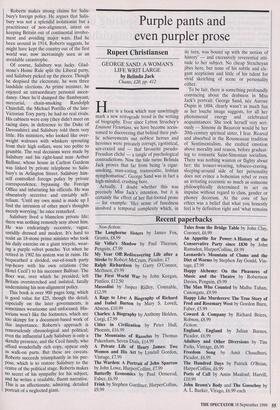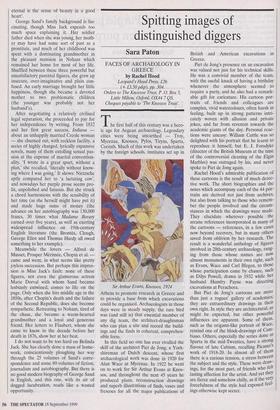Purple pants and even purpler prose
Rupert Christiansen
GEORGE SAND: A WOMAN'S LIFE WRIT LARGE by Belinda Jack Chatto, £20, pp. 412 Here is a book which may unwittingly mark a new retrograde trend in the writing of biography. Ever since Lytton Strachey's Eminent Victorians, we have become accus- tomed to discovering that behind their pub- lic achievements our noblest heroes and heroines were privately corrupt, egotistical, sex-crazed and — that favourite pseudo- Freudian cliché — a tangle of psychological contradictions. Now the tide turns: Belinda Jack proves that far from being 'a cigar- smoking, man-eating, transvestite, lesbian nymphomaniac', George Sand was in fact a high-minded, crashing bore. Actually, I doubt whether this was precisely Miss Jack's intention, but it is certainly the effect of her flat-footed prose — for example: 'Her sense of fusedness involved a temporal complexity which, in its turn, was bound up with the notion of history' — and excessively reverential atti- tude to her subject. No cheap Stracheyan jibes here, but none of his subtle and ele- gant scepticism and little of his talent for vivid sketching of scene or personality either.
To be fair, there is something profoundly convincing about the drabness in Miss Jack's portrait: George Sand, née Aurore Dupin in 1804, clearly wasn't as much fun as her louche image suggests, for all her phenomenal energy and celebrated acquaintances. She took herself very seri- ously — Simone de Beauvoir would be her 20th-century spiritual sister, I fear. Reared and absorbed in the Rousseauan tradition of Sentimentalism, she exalted emotion above morality and reason, before graduat- ing to romantic Saint-Simonian socialism. There was nothing wanton or flighty about her: the trouser-wearing, tobacco-craving, sleeping-around side of her personality does not evince a bohemian rebel or even an irritating eccentric so much as someone philosophically determined to act on impulse without regard to class, gender or phoney decorum. At the core of her ethics was a belief that what you honestly feel is by definition right and 'what remains eternal is the sense of beauty in a good heart'.
George Sand's family background is fas- cinating, though Miss Jack expends too much space explaining it. Her soldier father died when she was young, her moth- er may have had some sort of past as a prostitute, and much of her childhood was spent with a dominating grandmother in the pleasant mansion in Nohant which remained her home for most of her life. Shuffled between these three powerful but unsatisfactory parental figures, she grew up insecure, over-imaginative and plain con- fused. An early marriage brought her little happiness, though she became a devoted mother to two problematic children (the younger was probably not her husband's).
After negotiating a relatively civilised legal separation, she proceeded to pay for her independence by writing. From 1832 and her first great success, Indiana about an unhappily married Creole woman — she churned out, with reckless facility, a series of highly charged, lyrically expansive novels, many of them extolling sexual pas- sion at the expense of marital convention- ality. 'I wrote in a great spurt, without a plan,' she recalled, 'literally without know- ing where I was going.' It shows: Nietzsche aptly compared her to 'a lactating cow', and nowadays her purple prose seems pro- lix,, unpolished and fatuous. But she struck a chord harmonious with the sensibility of her time (as she herself might have put it) and made huge sums of money (the advance on her autobiography was 130,000 francs, 30 times what Madame Bovaty earned over five years), as well as exerting widespread influence on 19th-century English literature (the Brontes, Clough, George Eliot and Thomas Hardy all owed something to her example).
Meanwhile the lovers — Alfred de Musset, Prosper Merimee, Chopin et al. came and went, in what seems like pretty joyless succession. But perhaps this impres- sion is Miss Jack's fault: none of these figures, not even the glamorous actress Marie Dorval with whom Sand became lesbianly entwined, comes to life on the page. Only when she hits middle age in the 1850s, after Chopin's death and the failure of the Second Republic, does she become sympathetic. Retreating to Nohant, tired of the chase, she became a warm-hearted grandmother and a loyal and generous friend. Her letters to Flaubert, whom she came to know in the decade before her death in 1876, show her at her best.
I do not want to be too hard on Belinda Jack. She has clearly done a mass of home- work, conscientiously ploughing her way through the 25 volumes of Sand's corre- spondence and some 80 volumes of fiction, journalism and autobiography. But there is no good modern biography of George Sand in English, and this one, with its air of dogged lucubration, reads like a wasted opportunity.



























































































 Previous page
Previous page